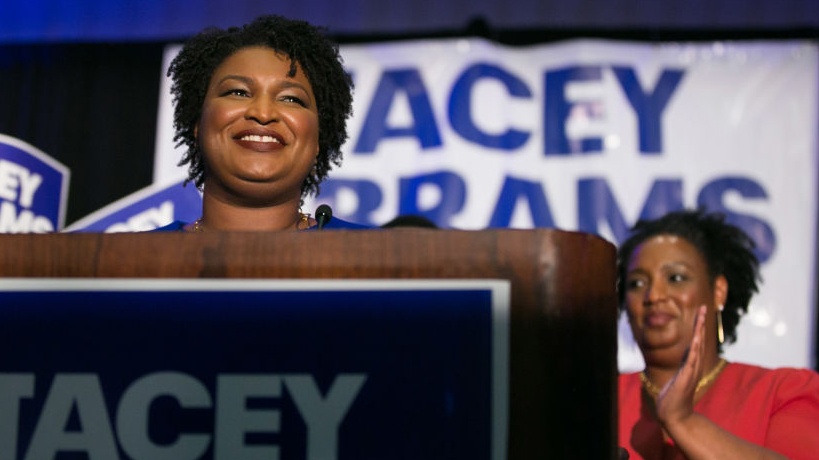U.S. District Judge Leslie Abrams Gardner, the sister of voting rights activist Stacey Abrams, has been the center of attention in recent weeks as Republicans continue to criticize her role in Georgia's upcoming Senate runoffs.
As Blavity previously reported, Republicans were outraged last week after Gardner blocked the plans of the election boards in Ben Hill and Muscogee counties in Georgia, who aimed to remove names of people whom they claimed had moved out of state ahead of the Jan. 5 election. She's also become the latest target of President Donald Trump, who is blaming her for his unfounded claim of voter fraud in Georgia, according to Newsweek.
But Gardner is much more than just the judge shaking things up for Republicans and she's also highly-lauded beyond her association to her well-known sister. Here are five things to know about U.S. District Judge Leslie Abrams Gardner.
1. The judge received a well-rounded education from prestigious institutions
According to The Chapman Law Review, Gardner received a joint bachelor’s degree in public policy and African American studies from Brown University in 1997. She then attended Yale Law School, where she earned her J.D in 2002. She clerked for the Honorable Marvin J. Garbis of the United States District Court for the District of Maryland before practicing law at Skadden Arps in Washington D.C., before becoming an Assistant U.S. Attorney for the Northern District of Georgia.
2. The senate unanimously confirmed the Obama appointee
According to Ballotpedia, former president Barack Obama
appointed Gardner in 2014, making her the first Black woman federal judge in Georgia. With a vote of 100-0 on Nov. 18, 2014, the Senate confirmed the Obama appointee.
The former president gave a raving review of the trailblazer.
"Leslie Joyce Abrams has had a distinguished legal career and I am honored to ask her to continue her public service on the federal bench," Obama said. "She will serve the American people with integrity and an unwavering commitment to justice."
| Matthew Parlow, dean of the Chapman University Dale E. Fowler School of Law, reflected on the senate's unanimous decision when he introduced Gardner as the keynote speaker during a symposium focusing on women's suffrage. |
"Now, let’s pause for a moment there and marinate on that in our era of, shall we say, strained partisanship," Parlow said. "She took the oath of office and in doing so—in taking the bench—became the first female federal judge in the Middle District of Georgia and the first African American woman to become an Article III judge in the State of Georgia."
3. Gardner has received dozens of honors and awards in her career
In 2013, the Georgia justice received the United States Attorney's Award for Performance as a Community Outreach Coordinator. Gardner has also been selected for several fellowship opportunities, including the Earl Warren Legal Training Fellowship, Rackham Merit Fellowship, Institute for the Recruitment of Teachers Fellowship and Mellon Minority Undergraduate Fellowship.
4. The judge found inspiration early in her life
Gardner said she decided to become a federal judge when she was in the second grade after learning about social justice advocates Thurgood Marshall and Constance Baker Motley.
"I do remember learning about Thurgood Marshall and about Constance Baker Motley and the work that they were doing and the fight that they engaged in to ensure equal rights for everyone," she said during her speech at Chapman University. "To me, their lives were legacies about fighting for justice and that is the legacy that I want to leave."
The Mississippi native also found inspiration from the stories of her parents and grandparents, who fought for civil rights despite the risk of facing severe consequences.
"My grandparents were from Mississippi and they grew up when asserting your rights could literally mean death," Gardner said. "It could mean you could lose your housing, your job, your livelihood in a moment’s notice. And so, for them they had to learn to not talk about it, to be very strategic in their actions in order to take care of their family."
5. She is proud of her Mississippi roots
Gardner and her sister, Abrams, were two of six siblings who grew up in Gulfport, Mississippi, according to CNN. The children were fortunate to have their grandmother, Wilter May Abrams, in their life for a long time. But Wilter recently passed away at the age of 91.
"Now think about this: these are poor Black people from Mississippi, and they were able to put three of their children through college; they went on to get graduate degrees," Gardner said about her grandparents.
"My grandmother lived to see one of her granddaughters run for governor of the State of Georgia and another become a United States District Court judge," Gardner said.
